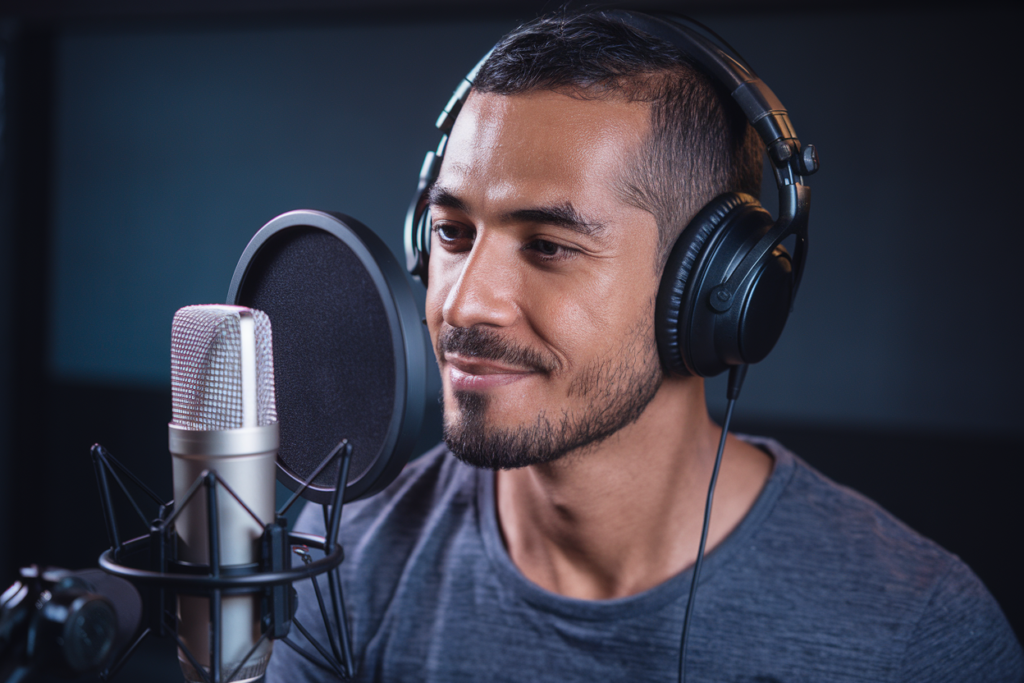Key Takeaways
- Cultural Impact: Arabic accents significantly shape character portrayals and influence audience perceptions in film and TV, enhancing storytelling through authenticity.
- Authenticity Matters: Using accurate Arabic accents fosters deeper connections with viewers and enriches narratives, while exaggerated or misrepresented accents can reinforce harmful stereotypes.
- Representation vs. Stereotypes: Skilled voice actors who understand cultural nuances play a crucial role in dismantling stereotypes and ensuring respectful representation of Arab identities.
- Notable Examples: Iconic characters like Jafar from Aladdin and Fayed from 24 demonstrate how authentic accents contribute to memorable performances that resonate with audiences.
- Challenges in Casting: Misrepresentation occurs when filmmakers fail to cast culturally connected actors, risking the reinforcement of negative biases rather than promoting genuine understanding.
- Audience Reception: Accurate portrayal of Arabic accents can lead to greater empathy among viewers, while inaccuracies may alienate or offend, highlighting the importance of thoughtful accent usage in media.
Ever wondered how the use of Arabic accents in film and TV shapes our understanding of culture? It’s more than just a voice; it’s a powerful tool that can influence perceptions and drive narratives. While Hollywood has often faced criticism for its portrayal of Arab characters, the way accents are used can either enrich storytelling or reinforce stereotypes.
As audiences become more aware, filmmakers must navigate this delicate balance. Authenticity matters now more than ever, and using Arabic accents responsibly can deepen connections with viewers. So how do these choices impact representation? Let’s explore the nuances behind accent usage in media and uncover what it means for both creators and audiences alike.
Overview of Arabic Accents in Film and TV
Arabic accents play a crucial role in film and television, shaping character portrayals and influencing audience perceptions. Authenticity matters deeply in storytelling, especially when it comes to representing diverse cultures. Using accurate Arabic accents can enhance the narrative’s credibility.
In many productions, filmmakers often employ voiceover talent to bring characters to life. This adds depth and realism, allowing viewers to connect more profoundly with the story. Voice actors skilled in various Arabic dialects can provide a unique perspective that enriches the viewing experience.
However, not all representations are created equal. Critics frequently highlight instances where Hollywood oversimplifies or misrepresents Arab identities through inaccurate accents or stereotypes. Such portrayals can perpetuate misunderstandings and reinforce negative biases.
The responsibility rests on filmmakers to embrace authenticity. Engaging talented voice artists who understand cultural nuances ensures respectful representation while captivating audiences. Choosing the right voice over artist means selecting someone who resonates with both the character’s background and the intended message of the film or show.
As you explore projects involving Arabic characters, recognize how vital these accents are for conveying genuine experiences. The right accent can transform a performance from superficial to impactful, fostering cultural appreciation among viewers worldwide.
Cultural Significance of Arabic Accents
Arabic accents play a crucial role in film and television, shaping narratives and influencing audience perceptions. Authentic use of these accents can create a richer understanding of characters and their backgrounds.
Representation and Stereotypes
Representation matters. When filmmakers accurately portray Arabic accents, they help dismantle harmful stereotypes that often plague media depictions. Skilled voice actors who understand cultural nuances bring authenticity to the table, ensuring characters resonate with viewers. In contrast, relying on exaggerated or inaccurate accents can reinforce negative biases and misunderstandings about Arab identities. This misrepresentation diminishes the depth of storytelling and alienates audiences from diverse cultures.
Impact on Perception of Arabic Culture
Accurate representation through authentic accents enhances the perception of Arabic culture in media. When you hear a genuine accent, it adds credibility to the character’s story, fostering empathy among viewers. A well-cast voice over talent not only enriches the narrative but also invites audiences into a more nuanced understanding of cultural contexts. Conversely, misrepresented accents can perpetuate misconceptions, leading to generalized views that overlook the rich diversity within Arab communities.
By prioritizing cultural authenticity in accent usage, filmmakers create opportunities for deeper connections between stories and their audiences, paving the way for a more inclusive entertainment landscape.
Notable Examples in Film and TV
Arabic accents play a crucial role in shaping characters and narratives within film and television. Authentic portrayal of these accents enhances cultural representation and contributes to the overall storytelling experience.
Iconic Characters Featuring Arabic Accents
Several iconic characters have made their mark through the use of Arabic accents, providing depth and authenticity. For instance, Jafar from Disney’s Aladdin captivates audiences not only with his villainous charm but also through his distinct accent, which adds layers to his character. Similarly, Fayed from 24 offers a nuanced depiction that challenges stereotypes by showcasing a complex persona while employing an authentic accent. These portrayals demonstrate how skilled voice actors can bring vibrancy to roles, making them memorable and relatable.
Films and Shows that Feature Authentic Accents
Numerous films and shows prioritize authentic Arabic accents, ultimately enriching the viewing experience. The Kite Runner, based on Khaled Hosseini’s novel, features a cast that employs genuine accents to reflect its Afghan setting accurately. The use of native speakers as voice talent brings credibility to the narrative while fostering emotional connections with viewers.
Another notable example is the series Ramy, which showcases diverse Arab-American experiences through authentic dialogue that resonates with audiences. By incorporating accurate accents into these productions, filmmakers create opportunities for deeper understanding among viewers while dismantling harmful stereotypes associated with Arab identities.
Through careful casting of skilled voiceover talent who embody these characteristics authentically, filmmakers can enhance narratives significantly—leading to richer storytelling experiences across genres.
Challenges and Controversies
The use of Arabic accents in film and TV presents several challenges and controversies. These issues often revolve around authenticity, representation, and audience perceptions.
Misrepresentation in Casting
Misrepresentation occurs when filmmakers cast actors who lack genuine connections to Arabic culture. This practice can lead to inauthentic portrayals that fail to resonate with viewers. When voiceover talent isn’t representative of the characters they portray, it risks reinforcing stereotypes rather than dismantling them. Authenticity matters; casting voice artists with real cultural backgrounds enhances storytelling by providing depth and realism. The goal should be accurate representation that respects the nuances of Arabic identities.
Audience Reactions to Accents
Audience reactions often vary based on how accurately accents are portrayed. Some viewers appreciate authentic accents as they create a richer narrative experience, while others may find exaggerated or inaccurate renditions alienating or offensive. The impact of an accent extends beyond mere sound; it shapes perceptions about cultural identity. Skilled voice actors can bridge gaps between cultures, making audiences more empathetic toward characters’ backgrounds and experiences. It’s essential for creators to understand these dynamics when developing projects that feature Arabic accents, as audience reception plays a significant role in a show’s success or failure.
In navigating these challenges, filmmakers have an opportunity to foster greater understanding through responsible casting choices and thoughtful representation of Arabic accents in their work.
Conclusion
You’ve seen how Arabic accents can shape narratives and enhance cultural understanding in film and TV. By prioritizing authenticity and representation, filmmakers not only enrich their stories but also challenge harmful stereotypes that persist in media. The careful choice of voice talent is crucial for creating relatable characters that resonate with diverse audiences.
As you engage with future films and shows, consider the impact of these accents on your perception of Arab identities. A commitment to genuine portrayals fosters empathy and invites viewers into a deeper appreciation of culture. Embracing this responsibility allows creators to pave the way for more inclusive storytelling, ultimately enriching the entertainment landscape for everyone.
Frequently Asked Questions
What is the significance of Arabic accents in film and television?
Arabic accents play a crucial role in shaping perceptions and narratives, enhancing cultural understanding. They contribute to authenticity in storytelling and help foster deeper connections between characters and audiences.
How do accurate accents affect audience perception?
Accurate accents enhance narrative credibility, allowing viewers to engage more deeply with characters. They can dismantle harmful stereotypes while fostering empathy and inviting a nuanced understanding of Arab cultures.
What are some examples of iconic characters with Arabic accents?
Notable examples include Jafar from Disney’s Aladdin and Fayed from 24. These portrayals showcase how authentic accents add depth to narratives and challenge negative stereotypes about Arab identities.
Why is authenticity important in accent usage?
Authenticity helps prevent misrepresentation of cultures, allowing for richer character development. Filmmakers must prioritize genuine accents to create relatable stories that resonate with audiences on a personal level.
What challenges exist regarding the portrayal of Arabic accents?
Challenges include casting actors without genuine cultural connections, leading to inauthentic portrayals that reinforce stereotypes. Audience reactions vary; while some appreciate authenticity, others may find exaggerated accents off-putting or offensive.
How can filmmakers improve their representation of Arabic culture?
Filmmakers can enhance representation by casting voice artists with real cultural backgrounds and prioritizing authentic accent usage. This approach fosters greater understanding and connection between stories and diverse audiences.







